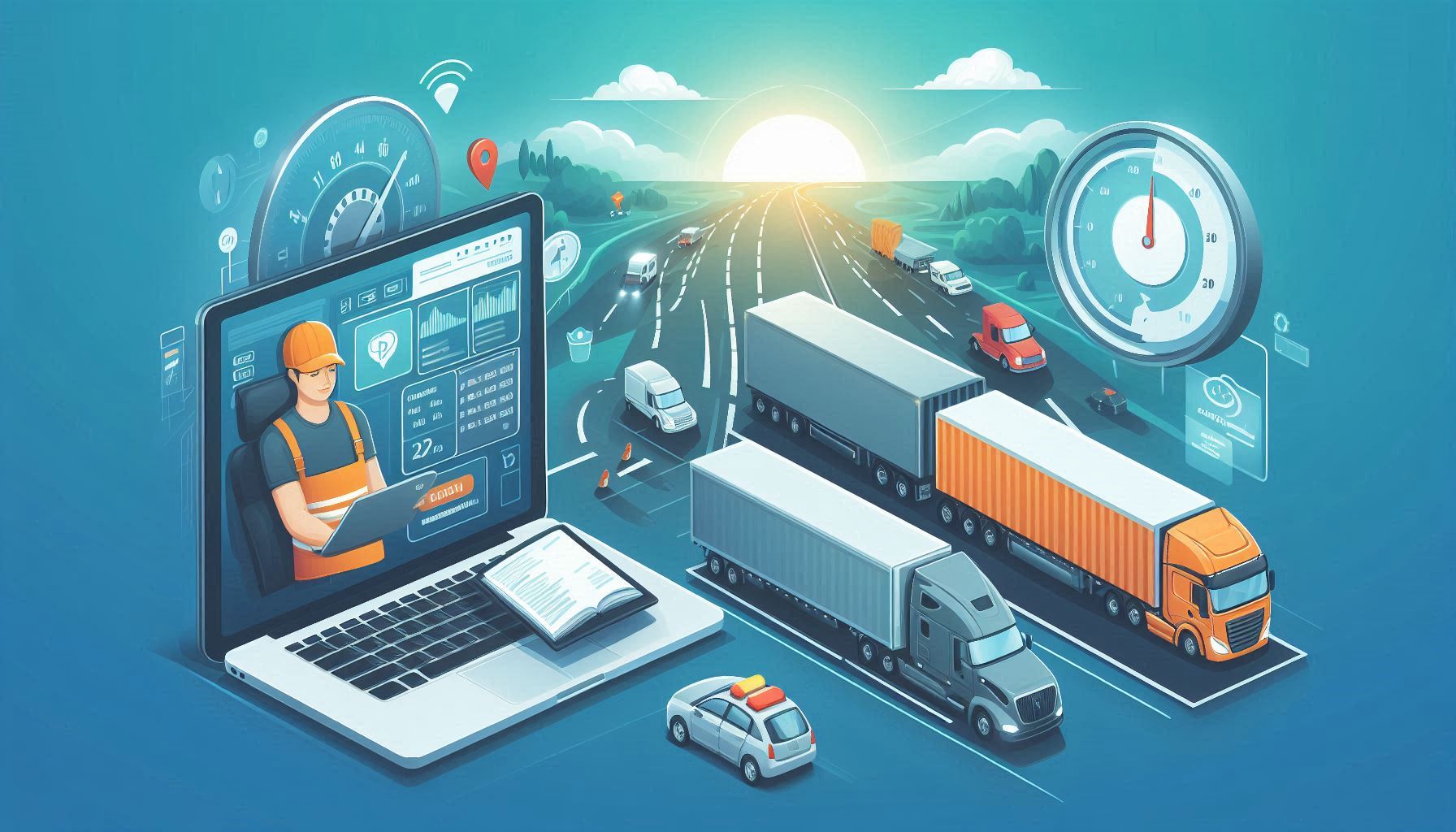The trucking industry plays a crucial role in the global economy, ensuring the timely and efficient transportation of goods across vast distances. With the rapid advancement of technology, the industry has undergone significant changes, and one of the most transformative innovations is trucking dispatch software. But what exactly is trucking dispatch software, and why has it become so essential for modern trucking companies?
In this extensive guide, we will explore the depths of trucking dispatch software, covering its features, benefits, and the ways in which it is revolutionizing the trucking industry. Whether you are a trucking company owner, a dispatcher, or someone with an interest in logistics, this article will offer valuable insights into the world of trucking dispatch software.

Understanding Trucking Dispatch Software
What is Trucking Dispatch Software?
Trucking dispatch software is a specialized digital tool designed to streamline and manage the operational processes of a trucking business. It automates the dispatching process, making it easier for companies to assign, track, and manage their fleets. Key features typically include real-time tracking, route optimization, load planning, and communication tools, all of which contribute to smoother and more efficient operations.
The Evolution of Trucking Dispatching
Dispatching in the trucking industry has come a long way from its traditional roots. In the past, dispatching was a manual process that involved numerous phone calls, paper logs, and a considerable amount of guesswork. This manual approach was not only time-consuming but also prone to errors and miscommunication. The introduction of trucking dispatch software has digitized and automated these processes, making them faster, more accurate, and significantly reducing the chances of human error.
Key Features of Trucking Dispatch Software
- Real-Time Tracking: Provides the ability to monitor the location and status of trucks in real-time, ensuring that dispatchers have up-to-date information at all times.
- Route Optimization: Helps plan the most efficient routes for deliveries, saving time and reducing fuel consumption.
- Load Management: Assists in assigning loads to the most appropriate trucks based on their capacity and availability, ensuring optimal resource utilization.
- Communication Tools: Facilitates seamless communication between dispatchers, drivers, and clients, reducing the likelihood of miscommunication.
- Reporting and Analytics: Generates detailed reports and analytics, allowing companies to assess performance and make data-driven decisions.
The Importance of Trucking Dispatch Software in the Modern Industry
In today’s highly competitive trucking industry, efficiency and accuracy are key to staying ahead of the competition. Trucking dispatch software provides the tools necessary to enhance productivity, reduce operational costs, and improve overall customer satisfaction. It has become an indispensable asset for trucking companies looking to optimize their operations and deliver superior service.
The Benefits of Trucking Dispatch Software
Enhanced Efficiency and Productivity
One of the most significant advantages of trucking dispatch software is the boost in efficiency and productivity it provides. By automating many of the manual processes involved in dispatching, companies can operate more smoothly and effectively. Dispatchers can focus on strategic planning rather than getting bogged down in routine tasks, drivers spend less time waiting for assignments, and deliveries are made more promptly.
Cost Reduction
Fuel is one of the largest expenses for trucking companies, and trucking dispatch software plays a crucial role in reducing these costs. By optimizing routes, the software helps minimize fuel consumption, cutting down on unnecessary expenses. Additionally, better load management reduces the number of empty miles driven, further contributing to cost savings.
Improved Customer Satisfaction
In the logistics industry, timely deliveries and accurate tracking are critical to maintaining customer satisfaction. Trucking dispatch software allows companies to provide real-time updates and accurate delivery estimates, which in turn helps build trust with clients. Satisfied customers are more likely to become repeat clients, contributing to the long-term success of the business.
Better Resource Allocation
Efficient resource allocation is key to maximizing the productivity of a trucking company. Trucking dispatch software helps companies allocate their resources—whether it’s trucks, drivers, or fuel—more effectively. By ensuring that the right resources are in the right place at the right time, companies can avoid bottlenecks and keep their operations running smoothly.
Enhanced Driver Satisfaction
Drivers are the backbone of any trucking operation, and their satisfaction is crucial to the company’s success. Trucking dispatch software can help improve driver satisfaction by providing them with clear instructions, optimized routes, and real-time support. When drivers feel supported and valued, they are more likely to perform well and stay with the company longer.
How Trucking Dispatch Software Works
Integration with GPS and Telematics
One of the core components of trucking dispatch software is its integration with GPS and telematics systems. This integration allows for real-time tracking of vehicles, providing dispatchers with accurate information about the location and status of their fleet. GPS integration also enables route optimization, helping to ensure that deliveries are made as efficiently as possible.
Centralized Dispatching System
A centralized dispatching system is another critical feature of trucking dispatch software. This system allows dispatchers to manage all aspects of the dispatching process from a single platform. All relevant information—such as load details, driver schedules, and delivery routes—is accessible in one place, reducing the risk of errors and miscommunication.
Automated Load Assignment
Automated load assignment is a powerful feature of trucking dispatch software that saves time and ensures that loads are assigned efficiently. By using predefined rules and criteria, the software can automatically match loads with the most suitable trucks based on factors like capacity, location, and driver availability. This automation speeds up the dispatching process and helps ensure that resources are used optimally.
Real-Time Communication
Effective communication is essential in the trucking industry, and trucking dispatch software provides the tools necessary for real-time communication between dispatchers, drivers, and clients. Whether it’s sending updates about delivery status, rerouting a driver due to traffic, or resolving an issue on the road, the software ensures that everyone involved is kept in the loop.
Data Collection and Analytics
Trucking dispatch software is not just about managing day-to-day operations—it also plays a crucial role in data collection and analytics. The software collects data on various aspects of the trucking operation, such as fuel usage, driver performance, and delivery times. This data can then be analyzed to identify trends, spot inefficiencies, and make informed decisions that drive continuous improvement.
Choosing the Right Trucking Dispatch Software
Scalability
When selecting trucking dispatch software, it’s essential to consider the scalability of the solution. As your business grows, the software should be able to grow with you. Look for a solution that can handle an increasing number of trucks, drivers, and loads without sacrificing performance.
User-Friendliness
Ease of use is another crucial factor to consider when choosing trucking dispatch software. The software should have an intuitive interface that is easy to navigate, even for those who are not tech-savvy. A steep learning curve can lead to mistakes and reduce the overall efficiency of your operations.
Customization Options
Every trucking company has its unique needs and workflows, so it’s important to choose software that offers customization options. Whether it’s the ability to integrate with existing systems, adjust workflows, or set up custom alerts, customization options can significantly enhance the value of the software.
Customer Support and Training
Reliable customer support is essential when implementing new software. Ensure that the provider offers ongoing support and comprehensive training resources to help your team get the most out of the software. Good customer support can make the difference between a smooth implementation and a frustrating experience.
Cost Considerations
While cost should not be the only factor in your decision, it’s important to consider the price of the software relative to the benefits it provides. Evaluate the total cost of ownership, including any setup fees, subscription costs, and potential savings in operational expenses. Often, the long-term benefits of increased efficiency and reduced costs will outweigh the initial investment.
Overcoming Common Misconceptions About Trucking Dispatch Software
It’s Too Expensive for Small Companies
A common misconception is that trucking dispatch software is only for large companies with big budgets. While it’s true that some advanced systems can be costly, there are many affordable options available for small and medium-sized trucking companies. These solutions often offer a range of pricing plans, allowing companies to choose the one that best fits their budget. Moreover, the long-term savings in operational costs often outweigh the initial investment.
Implementation is Too Complex
Another myth is that implementing trucking dispatch software is a complex and time-consuming process. However, most modern solutions are designed with ease of implementation in mind. Many software providers offer comprehensive onboarding services, including setup assistance, training, and support. With the right provider, you can have your new system up and running in no time.
It’s Only Useful for Large Fleets
Some believe that trucking dispatch software is only beneficial for large fleets, but this is far from the truth. Even small fleets can benefit from the increased efficiency, cost savings, and improved customer service that the software provides. In fact, smaller companies may find the software particularly valuable as it can help them compete with larger competitors by optimizing their operations and providing better service to their customers.
It’s Just a Scheduling Tool
While trucking dispatch software does include scheduling features, it is much more than just a scheduling tool. The software offers a wide range of functionalities, including route optimization, real-time tracking, communication tools, and analytics. These features work together to streamline operations, improve efficiency, and enhance customer satisfaction.
It’s Not Necessary for Traditional Operations
Some companies may believe that because they’ve been operating successfully with traditional methods, there’s no need to switch to trucking dispatch software. However, as the industry becomes more competitive and technology-driven, sticking with outdated methods can put you at a disadvantage. Trucking dispatch software can help you stay ahead of the curve by optimizing your operations and allowing you to provide better service to your customers.
Future Trends in Trucking Dispatch Software
Artificial Intelligence and Machine Learning
The integration of artificial intelligence (AI) and machine learning (ML) into trucking dispatch software is one of the most exciting trends in the industry. AI and ML can analyze vast amounts of data to identify patterns, predict outcomes, and make real-time decisions. For example, AI-powered dispatch software can predict traffic patterns, optimize routes based on real-time data, and even predict maintenance needs for vehicles.
Blockchain Technology
Blockchain technology is set to revolutionize the trucking industry by providing a secure and transparent way to manage and share data. In the context of trucking dispatch software, blockchain can be used to create immutable records of transactions, such as delivery confirmations, payments, and contracts. This can help reduce fraud, improve transparency, and increase trust between parties.
Autonomous Vehicles
While fully autonomous trucks are still in the development stage, the integration of autonomous vehicle technology into trucking dispatch software is a trend to watch. Dispatch software will need to evolve to manage autonomous trucks, including coordinating with human drivers, managing routes, and ensuring compliance with regulations.
Internet of Things (IoT) Integration
The Internet of Things (IoT) is transforming the trucking industry by enabling real-time data collection from a wide range of sensors and devices. IoT integration in trucking dispatch software allows for more accurate tracking of vehicles, monitoring of cargo conditions, and real-time updates on vehicle performance. This data can be used to optimize operations, reduce costs, and improve safety.
Enhanced Data Analytics
As more data becomes available, the demand for advanced data analytics in trucking dispatch software is increasing. Enhanced analytics can provide deeper insights into every aspect of the trucking operation, from driver performance to fuel efficiency. This can help companies identify areas for improvement, optimize their operations, and make data-driven decisions.
Implementing Trucking Dispatch Software in Your Business
Assessing Your Needs
Before implementing trucking dispatch software, it’s important to assess your company’s specific needs. Consider factors such as the size of your fleet, the complexity of your operations, and your budget. This will help you choose the right software solution that meets your requirements.
Choosing the Right Provider
Selecting the right software provider is crucial to the success of your implementation. Look for a provider with a strong track record, positive customer reviews, and a solution that fits your needs. It’s also important to consider the level of customer support and training the provider offers, as this will be essential during the implementation process.
Planning the Implementation
A successful implementation requires careful planning. Start by setting clear goals for what you want to achieve with the software, such as reducing costs or improving efficiency. Then, create a detailed implementation plan that includes timelines, responsibilities, and milestones. This will help ensure that the process goes smoothly and that you achieve your desired outcomes.
Training Your Team
Training is a critical component of a successful implementation. Ensure that all users, including dispatchers, drivers, and managers, receive comprehensive training on the software. This will help them understand how to use the software effectively and take full advantage of its features.
Monitoring and Optimization
Once the software is up and running, it’s important to monitor its performance and make adjustments as needed. Regularly review key metrics, such as fuel efficiency, on-time delivery rates, and customer satisfaction, to assess the impact of the software. Use this data to identify areas for improvement and optimize your operations over time.
Case Studies: Real-World Examples of Trucking Dispatch Software Success
Small Fleet, Big Gains
A small trucking company with a fleet of 10 trucks implemented dispatch software to improve its operations. Before the implementation, the company struggled with inefficient routing, high fuel costs, and frequent delays. After adopting the software, the company was able to optimize its routes, reduce fuel consumption by 15%, and increase on-time deliveries by 20%. The software also helped the company improve communication with its drivers and provide better service to its customers.
Mid-Sized Company, Major Improvements
A mid-sized trucking company with 50 trucks faced challenges in managing its growing fleet and ensuring timely deliveries. The company decided to implement trucking dispatch software to streamline its operations. The software’s real-time tracking and automated load assignment features allowed the company to reduce idle time, improve resource allocation, and enhance overall efficiency. As a result, the company saw a 25% reduction in operational costs and a 30% increase in customer satisfaction.
Large Fleet, Significant Savings
A large trucking company with a fleet of 200 trucks was looking for ways to reduce its operational costs and improve efficiency. The company implemented trucking dispatch software with advanced route optimization and data analytics features. The software helped the company identify inefficiencies in its operations, optimize its routes, and reduce fuel consumption by 20%. Additionally, the software’s reporting and analytics tools provided valuable insights that allowed the company to make data-driven decisions and further improve its operations.
Common Challenges in Implementing Trucking Dispatch Software and How to Overcome Them
Resistance to Change
One of the most common challenges in implementing trucking dispatch software is resistance to change. Employees may be reluctant to adopt new technology, especially if they are accustomed to traditional methods. To overcome this challenge, it’s important to involve employees in the decision-making process and provide comprehensive training and support. Communicate the benefits of the software and how it will make their jobs easier and more efficient.
Data Integration Issues
Integrating trucking dispatch software with existing systems can be a complex process, especially if the systems are outdated or incompatible. To address this challenge, it’s important to work with a provider that offers robust integration capabilities and provides support throughout the implementation process. Custom integrations may be necessary to ensure a seamless connection between the software and your existing systems.
High Initial Costs
The initial cost of implementing trucking dispatch software can be a barrier for some companies, especially small businesses. However, it’s important to consider the long-term benefits and potential cost savings that the software can provide. Look for a provider that offers flexible pricing plans and consider the return on investment (ROI) over time.
Ensuring Data Security
Data security is a top concern for many companies when implementing new software. Trucking dispatch software often involves sensitive information, such as customer details and financial data. To mitigate this risk, choose a provider that offers robust security features, such as encryption and regular security updates. It’s also important to establish data protection policies and provide training to employees on how to handle data securely.
Continuous Improvement and Updates
Trucking dispatch software is constantly evolving, with new features and updates being released regularly. Keeping up with these changes can be challenging, but it’s essential to ensure that your software remains effective and up-to-date. Work with a provider that offers regular updates and improvements, and consider establishing a process for regularly reviewing and updating your software.
Conclusion
In conclusion, trucking dispatch software has become an indispensable tool in the modern trucking industry. By automating and optimizing various aspects of fleet management, this software enhances efficiency, reduces operational costs, and significantly improves customer satisfaction. Whether you run a small fleet or manage a large operation, implementing dispatch software can provide you with the competitive edge needed in today’s fast-paced logistics environment. As the industry continues to evolve, staying ahead of the curve with the latest technology, such as AI, blockchain, and IoT integration, will ensure that your operations remain efficient, cost-effective, and responsive to market demands.
Investing in the right dispatch software not only improves day-to-day operations but also positions your company for long-term success by streamlining processes, improving resource allocation, and enhancing communication across all levels of your organization. As the future trends unfold, embracing these technological advancements will allow your business to thrive in the increasingly competitive and complex landscape of the trucking industry.
To discover more about how we can help your business, reach out to our knowledgeable dispatch consultants today. They are ready to assist you in navigating this vital aspect of your business journey.



